Teaching in Thailand vs. Japan
by Rachael Hornsby
Having started my TEFL adventures in Thailand, I have now spent a year teaching there, and another 6 months teaching in Japan (with a year back in the UK in between). If you might be considering either of these countries to teach English in, or are deciding between East and South East Asia in general, here’s my brief take on how these countries have compared so far for me. Enjoy!
The dosh
It’s of course not all about the money, but, in terms of bare numbers, in Thailand my teaching wage was 30,000 baht per month (around £ 700), whereas in Japan I earn 250,000 yen (~£2000). In both cases it is pretty much the standard amount for an inexperienced teacher.
My Thai wage obviously wasn’t a lot in UK terms, but the cost of living is so low in Thailand that it’s PLENTY to live on. My rent was about £80 (although my friends’ were cheaper!), and I could eat out every night for as little as 25 baht for a Pad Thai (about 50p!). Thailand and S.E. Asia as a whole is SO cheap that my Thai wage managed to take me on tonnes of adventures, such as tripping around Vietnam in my school holidays, and numerous weekends around Thailand, to Chiang Mai, Bangkok etc.
Living expenses obviously all cost so much more in Japan. My rent is 45,000 yen per month (over £ 350), (although I know in big cities like Tokyo it can be MUCH higher), and bills and food add much more on to that. Again, I seem to have spent a lot of spare cash so far in Japan travelling, and unfortunately just exploring mainland Japan can be really pricey- a bullet train to Tokyo from my island of Kyushu is about £170 (as opposed to a train I took to Laos from Southern Thailand for £15!).
In short, the main difference is, if you are strict with your money, and don’t go off travelling every spare minute (it’s just so tempting!!), your savings in Japan will stretch much further if you take them elsewhere, especially to other economically rich countries, like if you wanted to pay off debts in the UK (with the pound plunging, at this rate you could go home with a small fortune!). My friends have also taken extra tutoring jobs on the side if they really wanted to fill up their wallet, although this might not be allowed in your contract. And if you’re really looking for the big bucks, jobs where the company actually pay for your flights or accommodation, like ones in South Korea, might be an even better bet.
(*WRITTEN OCTOBER 2016! The pound is changing so much these days, so god knows how long these currency conversions will be accurate. A couple of days!?*)
Culture
If you’re not hoping for a culture shock, then you’re in the wrong game! There are obviously hundreds of wonderful/fascinating/infuriating sides of Thai and Japanese culture, but here’s a few:
Although there are reasons not to get on the wrong side of Thailand (in a rare case some people I knew had a pretty rough time being deported…), the country generally really does live up to its reputation as the “land of smiles”. From the random people I’d find to help me when my moped got a flat tire (more than once!), to the chatty monks on the train (let them talk to you first, don’t just go barging up to one!), it’s a great place for restoring faith in humanity. It’s also VERY laid back. The famously slow pace of pretty much anything there can drive many people absolutely up the wall- a train that should take 2 hours, ends up taking 5 hours, etc.-, but you will start to adopt the local “mai pen rai”, care-free attitude, and pretty much all of my friends left Thailand a less uptight person than when they arrived (who couldn’t do with giving themselves that gift?).
Japan is in some ways the opposite of Thailand’s laid back attitude. From the notoriously prompt trains, to the meticulous dividing of household recycling, everything is fantastically organised and reliable. I’m constantly amazed at how efficient things are and by the different things Japan has come up with to get stuff done! As in Thailand, people in Japan are exceptionally polite and friendly, and the hospitality in Japan is second to none, to the extent that I admittedly found myself feeling a bit aggrieved without it in on a recent trip to Hong Kong, making me appreciate Japan even more. The level of politeness did at first it come off as a bit oppressive (train carriages are often silent, etc.), making it seem hard to ‘break in’ or really socialise, but of course with a little more patience you get to meet more people, and make amazing new friends. I think you could say Japan is more like the UK in that way!
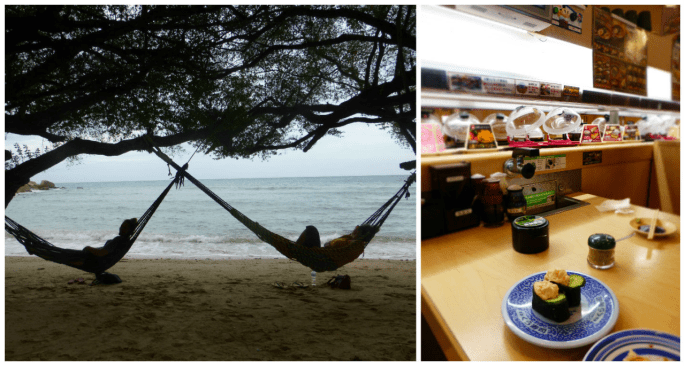
“mai pen rai” life on Koh Samet vs. ingenious conveyor belt sushi
The job
As far as the job goes, each school can differ widely depending on the age you’re teaching, whether it’s private or government, etc. etc., but there are a few general trends, which seem to be mainly extensions of Thailand’s “mai pen rai” culture vs. the super efficient Japan.
Although I had textbooks for some of my classes at my Thai school, this wasn’t that common, and it tends to be a “do it yourself” kind of attitude to the curriculum/ teaching in general. This can obviously be a bit scary if it’s your first time teaching, and can be frustrating if you feel like you’re not getting the help or direction you’d like, but it’s also great as it gives you freedom in what you want to teach, allows you to experiment with your teaching style, and is a great challenge to get you tuck into the job. You also pretty much never know what’s going on- most weeks I’d turn up to work with all my lessons planned, only to find out at least 1 was cancelled for some random reason I didn’t know of, like the day we found ourselves ushered onto a school bus first thing, with kids all prepared wearing traditional outfits, and we spent the morning sitting in front of monks in a temple listening to them chant!
Japan, on the other hand, is a lot more organised in its approach. In my job teaching at a private kindergarten, I have tonnes more support, like a curriculum, weekly meetings, many of my lessons already planned for me etc. In comparison to Thailand, my job feels so much more coherent, although I’ve heard that other jobs for the larger companies can be even more structured. In a way this means you can’t use as much creativity in your teaching, and aren’t being pushed quite as hard. And I do sometimes miss the manic spontaneity of Thailand (in my first month here, I was actually thrown into presenting an assembly without notice, and secretly loved it!). I also have to work evenings this time, like many other language schools, but I do have a lot more free time in the day that I don’t have to spend planning lessons, and generally feel a lot less ‘at sea’.

Thai assembly
Things to see and do
You obviously can’t spend all your time gallivanting around if you have a teaching job, but you can pack plenty of sightseeing into your free weekends and holidays if you fancy (and why ever not?!). In Thailand you’ll find more elephants, street markets, and idyllic beaches, and it can be more of a wild party scene if you land a job near a tourist area (I’ve had more ‘buckets’ of cocktails than I’d care to remember…). Japan has more impressive mountains and hiking (being made up of volcanic islands), there are hot spring baths and karaoke bars everywhere, and you can go skiing in winter (which I’m 99% sure you can’t do in Thailand!). It also has its share of good nightlife (especially in the big cities), and even has gorgeous beaches and great scuba diving spots down in balmy Okinawa. Basically, Japan and Thailand are both popular tourist destinations for good reason- they both have beautiful scenery, endless temples, fascinating festivals etc. etc. So, unless there’s something you’re absolutely itching to do, like climb Mount Fuji or rave at a full moon party, you’ll find plenty of weird and wonderful ways to keep you occupied in both!

Beach in Koh Chang vs. Hike in Nagasaki
Getting down and dirty
Thailand is by no means a third world country, but Japan is miles ahead of it when it comes to things like infrastructure and sanitation, and feels even more developed than the UK in some ways. Japan is probably the cleanest place I’ve ever been, and they have technology for everything, from heated toilet seats to shoe vending machines (probably the name for it!) at the bowling alley. Thailand, on the other hand, can take a little getting used to for a Westerner. Rather than having heated toilets, we had to flush the loo using a bucket in our Thai school, and if you’re doing things on the cheap (which you might as well!), then you’ll find yourself, for example, sitting on plastic chairs at a food stall in street, with stray dogs wandering around you whilst you eat your dinner. There are also more critters around in Thailand- I often found cute baby geckos living in my shoes, I was never without at least 1 mosquito bite (although I am especially attractive to the buggers!), and my town happened to be overrun with mafia-like monkeys.
The things in Thailand that seem so alien at first really don’t take long to feel normal, and to be honest I’m grateful for the experience of living with a tiny bit less luxury, for helping me appreciate how lucky we are at home, and showing me what I can actually live without. So if you want this type of challenge, I’d have to recommend Thailand, but if you want a more easy transition (dealing with a brand new Asian culture can be enough in itself!), then go for Japan. I myself am glad I did both in the order that I have, since I can appreciate the wonders of Japan even more!
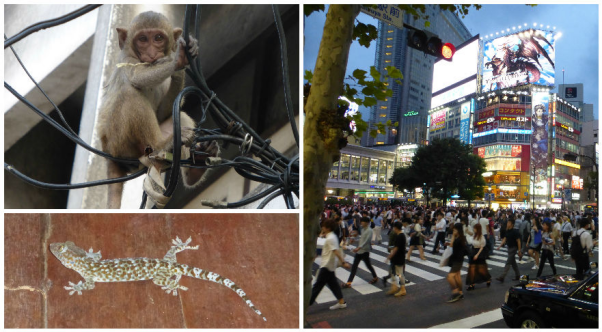
Critter friends in Thailand vs. Super sleek Shibuya
The language
Both Thai and Japanese are a world away from English, and I can’t profess to be much of an expert at either, but here goes. The Thai language has 1 ‘alphabet’ (or set of characters,) and uses lots of different tones. These can be seriously hard to pick up (“ma” can have a whole host of meanings depending on your tone), but luckily Thais often understand what a farang (foreigner) is getting at without them. They often drop unnecessary words from sentences (as in Japan!), so I wasn’t too paranoid about having bad grammar either. The little Thai I learnt came in very handy and was really appreciated, especially in tourist spots (I was all but given applause just ordering pineapple in Krabi!). To be honest you can get by with very little Thai if you wish, and it’s surprising how many Thais speak some English anyway, even in remote parts of the country.
Japanese seems harder to me. This may just be because I’ve put more effort into learning it, and so have realised what a mountain it is to really learn a language. Thailand’s “alphabet”, once learnt, can get you reading any Thai for good (I’ve been told!). Japan, however, has 3 sets of characters, and I can read the 2 basic ones (very handy for things like Western food menus), but the 3rd set of Chinese characters feels like it may take me an age to tackle (I’m sure Japanese people can’t even read them all!), and I still can’t read that much when I’m out and about. Unlike Thai, Japanese isn’t tonal, so once you’ve learnt words or phrases, it’s pretty easy to catch them and pronounce them, but Japan also seem to have many more ways of saying one thing, depending on different situations or who you’re speaking to. This can make it more daunting when trying to use it yourself, or frustrating when you don’t understand something you thought you knew! Basic English also seems less widespread here, so there are certain things I’ve simply had to drag a Japanese speaker along to help me do, like buying a phone contract, but you manage!
I’ve been frustrated at times by my lack of skill at both languages, but really learning either can take years, and many TEFL teachers get by fine speaking very little, if any. It will of course enhance your experience whatever amount you manage to learn, so you might as well give it a bash, and if you really want to get the hang of it, just get yourself a local boy/girlfriend (seems to work every time!)
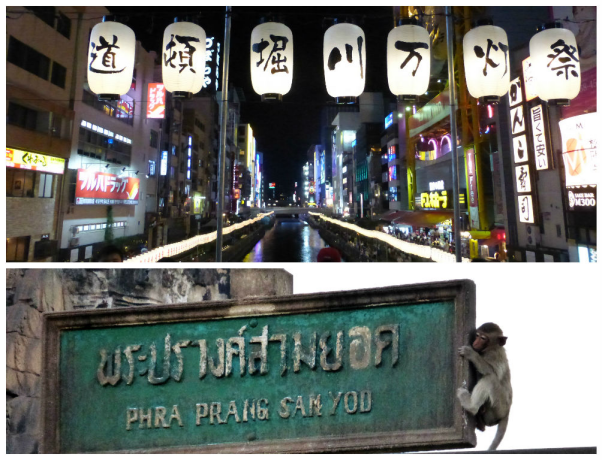
Japanese vs. Thai (Jibberish vs. nonsense??)
“Konichiwa, Japan!” or “Sawadee Ka, Thailand!”??
The beauty of a TEFL job is you get to spend months in a country that many people only spend a fortnight visiting on holiday, which teaches you so many beautiful/ ridiculous things about a place, and so there could be a billion more ways I could use to compare these two amazing countries (I could write a whole post on types of beer! Actually I might do that…). But in super brief, Thailand and Japan are like riding a Tuk Tuk vs. taking the bullet train. One is a bit more of a slow, bumpy ride, and the other is more sleek and a bit more predictable, but they are both brand new experiences, that can be equally thrilling (you’d be surprised how fast a Tuk tuk can go!), and will take you to places to never expected! Both countries are amazing, so if there’s anything at all drawing you to one or the other, just pick that one and GO! You won’t regret it.
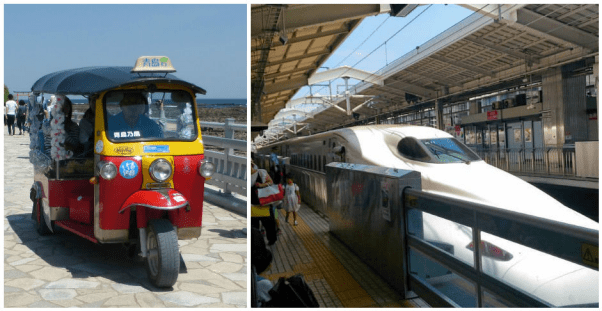
Tuk tuk or bullet train?

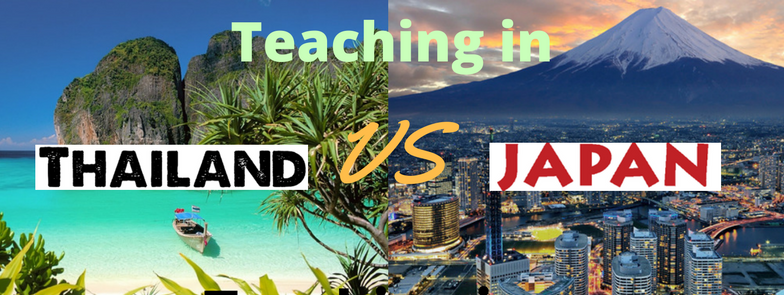
this will help me choose later, what about new older teachers 47? or do thy just want young ones?
LikeLiked by 1 person
The schools I have worked at have both had teachers of all ages! including a guy in his fifties. A few schools might be picky, but you’ll definitely find something somewhere!
LikeLiked by 2 people
Ice worked in both and would say as long as you are below pension age you should be fine
LikeLiked by 1 person
Great post! I’m currently teaching in China but visited Thailand and Japan this year and have thought about teaching in those countries in the future. Thanks for sharing your info!
LikeLiked by 1 person
Hi! Wonderful and informative post. I’m a traveling ESL, so I found this very insightful. Where are you in Kyushu? My wife and I are in Beppu for the next week. We would love to meet if possible. Also, check out our blog.
LikeLiked by 1 person
Hi, sorry just spotted this! Thank you! I’m in Kurume city, little bit middle of nowhere. Hope you have enjoyed Kyushu!
LikeLiked by 1 person
This is awesome! I’m currently teaching in Japan, and my mom is from Thailand, so I’ve been several times since I was a kid; it’s fascinating to read about the differences. Thanks for posting this!
LikeLike
This is certainly very insightful, having taught in China and in Turkey. Jobs in Japan seem a lot more difficult to get as everything is so organized and structured (it takes forever to get a background check!). Could you please tell me/add on about what you had to go through to actually start working there, in terms of paperwork and other documentation?
LikeLike
This is great, I’ve always wanted to teach in Japan and found this very insightful, but having troubles since I don’t have a passport from an English speaking country. Do you have any advice?
Thanks for sharing!
LikeLike